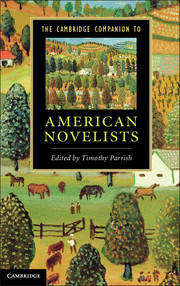Book contents
- Frontmatter
- Contents
- Contributors
- Introduction
- 1 James Fenimore Cooper
- 2 Nathaniel Hawthorne
- 3 Herman Melville
- 4 Harriet Beecher Stowe
- 5 Mark Twain
- 6 Henry James
- 7 Edith Wharton
- 8 Theodore Dreiser
- 9 Willa Cather
- 10 F. Scott Fitzgerald
- 11 Ernest Hemingway
- 12 William Faulkner
- 13 Henry Roth
- 14 Djuna Barnes
- 15 Zora Neale Hurston
- 16 Richard Wright
- 17 Raymond Chandler
- 18 Ralph Ellison
- 19 J. D. Salinger
- 20 Patricia Highsmith
- 21 Vladimir Nabokov
- 22 Jack Kerouac
- 23 Saul Bellow
- 24 Kurt Vonnegut
- 25 John Updike
- 26 Thomas Pynchon
- 27 Toni Morrison
- 28 Philip Roth
- 29 Don DeLillo
- 30 Cormac McCarthy
- Guide to Further Reading
- Index
- References
21 - Vladimir Nabokov
Published online by Cambridge University Press: 05 December 2012
- Frontmatter
- Contents
- Contributors
- Introduction
- 1 James Fenimore Cooper
- 2 Nathaniel Hawthorne
- 3 Herman Melville
- 4 Harriet Beecher Stowe
- 5 Mark Twain
- 6 Henry James
- 7 Edith Wharton
- 8 Theodore Dreiser
- 9 Willa Cather
- 10 F. Scott Fitzgerald
- 11 Ernest Hemingway
- 12 William Faulkner
- 13 Henry Roth
- 14 Djuna Barnes
- 15 Zora Neale Hurston
- 16 Richard Wright
- 17 Raymond Chandler
- 18 Ralph Ellison
- 19 J. D. Salinger
- 20 Patricia Highsmith
- 21 Vladimir Nabokov
- 22 Jack Kerouac
- 23 Saul Bellow
- 24 Kurt Vonnegut
- 25 John Updike
- 26 Thomas Pynchon
- 27 Toni Morrison
- 28 Philip Roth
- 29 Don DeLillo
- 30 Cormac McCarthy
- Guide to Further Reading
- Index
- References
Summary
“I am as American as April in Arizona.” With this affirmation in 1966, Vladimir Nabokov (1899–1977) both declared his firm allegiance to the country to which he had emigrated in May 1940 and displayed a salient feature of his verbal art: his creative approach to language and his fondness for rejuvenating dead clichés (“American as apple pie”). Yet he also declared in 1966 that “the writer’s art is his real passport” (SO, 63), and one senses that as he matured as a writer of English-language fiction, Nabokov sought to promote a synthesis of the best of Russian, European, and Anglo-American literary traditions. Indeed, in answering a question about national identity in 1964, Nabokov touched upon the many places he had lived (and the many cultures he had experienced): “I am an American writer, born in Russia and educated in England where I studied French literature, before spending fifteen years in Germany” (SO, 26). In his best work he combines vividly observed details about personalities and settings with allusive references to a range of literary material, from medieval Russian epics to French symbolism to the latest manifestations of popular culture.
Nabokov had been a leading figure in the Russian émigré literary community (having published eight novels, more than forty short stories, and dozens of poems) when he arrived in the United States. Now he was faced both with the daunting prospect of reinventing himself as a writer in English and the more immediate task of trying to support himself, his wife, and his young son in a new country. Initially, he had to rely on charity and on private language instruction. Over time, he began publishing book reviews in the New Republic and short stories and poems in the Atlantic Monthly. He taught summer courses at Stanford in 1941 and obtained a part-time position as a lecturer at Wellesley College that eventually became a full-time position, with courses on literature and on the Russian language. He also worked at the Museum of Comparative Zoology at Harvard University, researching and cataloging butterflies.
- Type
- Chapter
- Information
- The Cambridge Companion to American Novelists , pp. 209 - 218Publisher: Cambridge University PressPrint publication year: 2012



